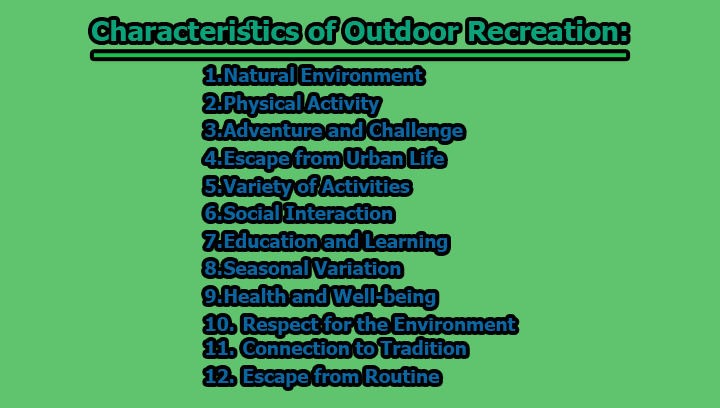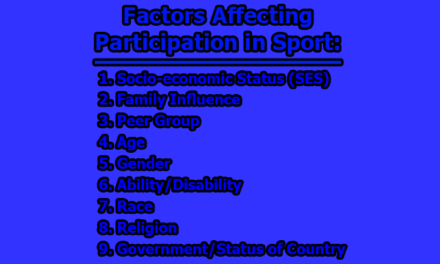Outdoor recreation is a multifaceted and enriching human activity that involves engaging with the natural environment while seeking adventure and personal growth, all while adhering to a profound sense of respect for the countryside. In this article, we will delve into the characteristics of outdoor recreation, and its significance in today’s world.
Definition of Outdoor Recreation:
Outdoor recreation can be defined as any leisure activity that takes place in the great outdoors, typically in natural settings. It encompasses a wide array of activities, from hiking and camping to kayaking and wildlife observation. What sets outdoor recreation apart is its inherent connection to the natural world, offering individuals the chance to escape the hustle and bustle of urban life and connect with the environment in a meaningful way.
Characteristics of Outdoor Recreation:
Outdoor recreation is a diverse and engaging set of activities that take place in natural outdoor settings. These activities are characterized by various features that distinguish them from indoor or urban leisure pursuits. Here are some key characteristics of outdoor recreation:
1. Natural Environment: Outdoor recreation is distinguished by its intimate connection to natural surroundings. Participants venture into forests, mountains, deserts, bodies of water, and other natural landscapes to engage with and appreciate the environment. This connection allows individuals to experience the inherent beauty and serenity of these settings, fostering a sense of awe and wonder.
2. Physical Activity: Most outdoor recreational activities involve physical exertion. Whether it’s the cardiovascular workout of hiking, the muscle engagement of rock climbing, or the endurance required for long-distance cycling, these activities encourage participants to use their bodies. This physical engagement promotes physical fitness, strength, and overall well-being.
3. Adventure and Challenge: A hallmark of outdoor recreation is the presence of adventure and challenge. Participants actively seek out experiences that take them out of their comfort zones. This may involve conquering a difficult hiking trail, navigating turbulent whitewater rapids, or scaling challenging rock faces. The presence of challenge adds an exciting dimension to outdoor activities and often results in a sense of personal achievement.
4. Escape from Urban Life: Outdoor recreation offers a refuge from the urban grind and the relentless pace of modern life. It provides an opportunity for individuals to escape the noise, pollution, and constant connectivity of urban environments. By retreating to natural settings, people can disconnect from technology and the demands of daily routines, allowing them to relax and rejuvenate.
5. Variety of Activities: The world of outdoor recreation is remarkably diverse, catering to a wide range of preferences and skill levels. Activities span across the spectrum, from relatively low-intensity pursuits like birdwatching and picnicking to high-energy endeavors such as mountaineering and backcountry skiing. This diversity ensures that there’s something for everyone to enjoy in the great outdoors.
6. Social Interaction: While outdoor recreation can be a solitary pursuit, it also offers abundant opportunities for social interaction. Many people choose to partake in outdoor activities with friends, family, or like-minded individuals who share their interests. Outdoor clubs, groups, and organizations dedicated to specific pursuits foster a sense of community and camaraderie.
7. Education and Learning: Engaging in outdoor recreation often leads to educational experiences. Participants may learn about ecosystems, wildlife, geology, navigation, survival skills, and more. This educational component enhances the appreciation and understanding of the natural world, turning recreational outings into valuable learning experiences.
8. Seasonal Variation: Many outdoor recreational activities are subject to seasonal changes, depending on weather and environmental conditions. For instance, skiing and snowboarding are winter pursuits, while hiking and camping are more popular in the warmer months. This seasonal variation keeps outdoor enthusiasts engaged and adaptable, as they adjust their activities to suit different times of the year.
9. Health and Well-being: Outdoor recreation offers a holistic approach to health and well-being. Physical activity in natural settings not only promotes physical fitness but also has positive effects on mental health. The fresh air, exposure to natural environments, and immersion in green spaces contribute to reduced stress, improved mood, and an overall sense of well-being.
10. Respect for the Environment: A fundamental characteristic of outdoor recreation is the deep respect for the environment. Responsible outdoor enthusiasts adhere to ethical guidelines and principles, such as the “Leave No Trace” philosophy. These principles emphasize minimizing human impact on the natural world, including proper waste disposal, staying on designated trails, and respecting wildlife habitats. This commitment to environmental responsibility ensures the sustainability of outdoor activities and the protection of natural ecosystems for future generations.
11. Connection to Tradition: Many outdoor recreational activities have deep cultural and historical roots. For example, camping, hunting, and fishing have been integral parts of human history for centuries. Engaging in these activities often connects participants to cultural traditions and heritage, adding depth and significance to their experiences.
12. Escape from Routine: Outdoor recreation provides a valuable break from the monotony of daily life. It offers a change of scenery, routine, and pace. This escape from the everyday grind provides individuals with mental clarity, relaxation, and a sense of renewal, ultimately improving their overall quality of life.
The Significance of Outdoor Recreation in Today’s World:
In the rapidly evolving landscape of the 21st century, outdoor recreation stands as a beacon of respite and rejuvenation. Its significance in today’s world cannot be overstated, as it plays a multifaceted role in enhancing mental health, promoting physical fitness, fostering environmental stewardship, contributing to economies, and building vibrant communities.
1. Mental Health and Well-being: In the hustle and bustle of modern life, where digital screens and urban environments dominate, outdoor recreation serves as a sanctuary for mental health and overall well-being.
a) Stress Reduction: The natural world offers a tranquil escape from the incessant demands and distractions of technology. Time spent outdoors allows individuals to unplug, reducing stress and promoting relaxation. The sights and sounds of nature have a calming effect on the mind, providing much-needed relief from the anxieties of daily life.
b) Reconnection with Self: Outdoor recreation provides an opportunity for introspection and self-discovery. Away from the noise and fast-paced routines, individuals can reconnect with their inner selves, gaining clarity of thought and a deeper understanding of their own needs and desires.
c) Mindfulness and Mental Resilience: Engaging in outdoor activities encourages mindfulness, a state of heightened awareness of the present moment. This practice has been linked to improved mental resilience, reduced symptoms of anxiety and depression, and increased overall psychological well-being.
2. Physical Fitness: The prevalence of sedentary lifestyles and health concerns like obesity have become growing issues worldwide. Outdoor recreation offers an attractive and effective solution to combat these challenges.
a) Active Pursuits: Outdoor activities, such as hiking, biking, trail running, and team sports like soccer and ultimate frisbee, motivate people to lead more active lives. The joy and excitement of these pursuits often make physical exercise enjoyable rather than a chore.
b) Improved Physical Health: Regular engagement in outdoor recreational activities contributes to improved physical fitness. It enhances cardiovascular health, strengthens muscles, and supports healthy weight management. Outdoor exercise also provides essential exposure to vitamin D from sunlight, which is vital for bone health.
3. Fostering Environmental Stewardship: Outdoor recreation enthusiasts naturally develop a strong bond with the environment, which leads to a heightened sense of responsibility for its well-being.
a) Environmental Awareness: Spending time in natural settings exposes individuals to the wonders of the natural world. This firsthand experience often results in a deeper understanding of environmental issues, such as habitat conservation, biodiversity preservation, and climate change.
b) Advocacy and Conservation: Many outdoor enthusiasts actively engage in environmental advocacy and conservation efforts. They volunteer their time and resources to protect and restore natural areas, participate in clean-up initiatives, and advocate for policies that support environmental sustainability. This collective action contributes to the preservation of fragile ecosystems and the mitigation of environmental challenges.
4. Economic Benefits: Outdoor recreation is not only a source of personal enrichment but also a significant contributor to local and national economies.
a) Job Creation: Various sectors benefit from outdoor recreation, including outdoor gear manufacturing, tourism, and hospitality. These industries create jobs and stimulate economic growth, particularly in regions with abundant natural amenities.
b) Property Values: Communities with access to outdoor recreation opportunities often experience increased property values. The appeal of nearby outdoor activities, such as hiking trails, lakes, or national parks, attracts residents and visitors alike, driving up demand for real estate.
5. Building Communities: Outdoor recreation is a powerful tool for community building, fostering connections and a sense of belonging among participants.
a) Social Interaction: Engaging in outdoor activities often involves joining clubs, groups, or organizations dedicated to specific pursuits. These communities provide opportunities for social interaction, skill-sharing, and networking. Participants form lasting bonds with like-minded individuals, creating a sense of camaraderie.
b) Inclusivity and Diversity: Outdoor recreation communities are increasingly recognizing the importance of inclusivity and diversity. Efforts are being made to ensure that people of all backgrounds and abilities have access to outdoor activities, promoting a more inclusive and equitable society.
In conclusion, outdoor recreation stands as a dynamic and essential component of our contemporary world. Its multifaceted significance extends far beyond the enjoyment of leisure activities in natural settings. It serves as a sanctuary for mental well-being, offering solace and escape from the fast-paced, technology-driven lives we lead. Simultaneously, it encourages physical fitness and a healthier lifestyle, addressing pressing health concerns. Moreover, outdoor recreation cultivates environmental stewardship, nurturing a deep sense of responsibility for our planet’s well-being. Economically, it fuels growth, generating jobs and elevating property values in communities with access to natural amenities. Ultimately, it is a powerful force for community building, forging connections and inclusivity among participants. As we navigate the complexities of modern existence, outdoor recreation continues to remind us of the profound and enduring benefits of our connection to nature and to one another.
References:
- Manning, R. E. (2011). Studies in outdoor recreation: Search and research for satisfaction (3rd ed.). Oregon State University Press.
- Ewert, A., & Hollenhorst, S. (2012). Outdoor adventure education: Foundations, theory, and research. Human Kinetics.
- Driver, B. L., Brown, P. J., & Peterson, G. L. (1991). Benefits of leisure. Venture Publishing, Inc.
- Henderson, K. A., & Bialeschki, M. D. (2002). A case for leisure’s inclusion in the ecological model. Journal of Leisure Research, 34(4), 427-452.
- Neill, J. T., & Dyment, J. E. (2003). Outdoor education in Canada: A contemporary view. The Journal of Experiential Education, 26(3), 122-137.
- Van Der Zanden, J., Hoekstra, E. J., & Mayer-Smith, J. (2014). Investigating the characteristics and experiences of exemplary outdoor leaders. Journal of Outdoor and Environmental Education, 17(2), 129-144.
- Sharpe, E. K. (2011). Understanding the motivations and benefits of environmental volunteering in older adults. Environment and Behavior, 43(4), 470-491.
- Kuentzel, W. F., & Heberlein, T. A. (1992). Benefits from the wilderness. Environmental Management, 16(6), 713-719.
- Gatrell, A. C. (2013). Geographies of nature: Societies, environments, ecologies. Sage Publications.
- Moore, R. L., Graefe, A. R., & Gitelson, R. J. (1993). Fishing participation and the use of water and related resources. Leisure Sciences, 15(3), 203-220.

Library Lecturer at Nurul Amin Degree College










